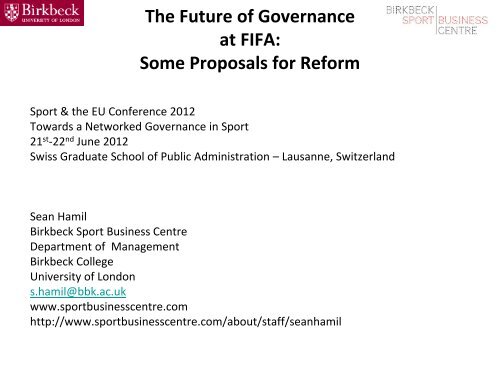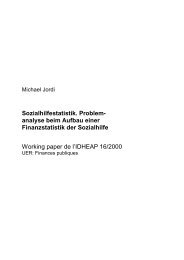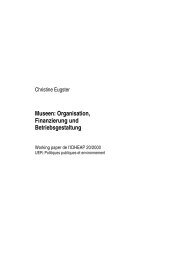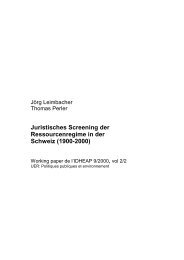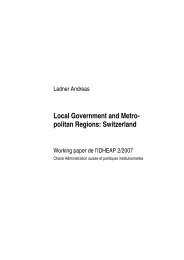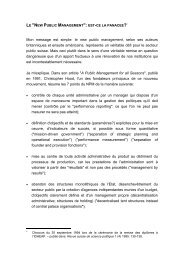The Organisation of FIFA - IDHEAP
The Organisation of FIFA - IDHEAP
The Organisation of FIFA - IDHEAP
You also want an ePaper? Increase the reach of your titles
YUMPU automatically turns print PDFs into web optimized ePapers that Google loves.
<strong>The</strong> Future <strong>of</strong> Governance<br />
at <strong>FIFA</strong>:<br />
Some Proposals for Reform<br />
Sport & the EU Conference 2012<br />
Towards a Networked Governance in Sport<br />
21 st -22 nd June 2012<br />
Swiss Graduate School <strong>of</strong> Public Administration – Lausanne, Switzerland<br />
Sean Hamil<br />
Birkbeck Sport Business Centre<br />
Department <strong>of</strong> Management<br />
Birkbeck College<br />
University <strong>of</strong> London<br />
s.hamil@bbk.ac.uk<br />
www.sportbusinesscentre.com<br />
http://www.sportbusinesscentre.com/about/staff/seanhamil
Presentation <strong>Organisation</strong><br />
1. <strong>The</strong> Origins <strong>of</strong> Interest in Corporate Governance in Sport– Why Is It Important?<br />
2. <strong>The</strong> UK Corporate Governance Code (2010) – Lessons for Sport <strong>Organisation</strong>s.<br />
3. <strong>The</strong> <strong>Organisation</strong> <strong>of</strong> World Football.<br />
4. <strong>FIFA</strong>’s <strong>Organisation</strong>al Structure & Purpose:<br />
- Focus on the “solidarity” function.<br />
5. <strong>FIFA</strong>’s Governance Structure - An Historical Critique:<br />
- Key focus on the roles <strong>of</strong> the Executive Committee and the President.<br />
6. Some Concluding Thoughts.
<strong>The</strong> Origins <strong>of</strong> Interest in<br />
Corporate Governance in Sport<br />
– Why Is It Important ?
<strong>The</strong> Origins <strong>of</strong> Interest in<br />
Corporate Governance<br />
in Sport<br />
• A series <strong>of</strong> major corporate governance failings in sport governing bodies, with<br />
significant consequences, leads to calls for governance reform:<br />
– Salt Lake City Winter Olympics bid bribery scandal.<br />
– <strong>FIFA</strong> 2018/2022 World Cup bids scandal and ongoing financial scandals which<br />
see multiple resignations by Executive Committee members.<br />
• “Something must be done”.
<strong>The</strong> Origins <strong>of</strong> Interest in<br />
Corporate Governance<br />
in Sport: <strong>FIFA</strong><br />
• In October 2011, <strong>FIFA</strong> announces the establishment <strong>of</strong> four “task forces” to review<br />
various aspects <strong>of</strong> the organisation’s governance and recommend reforms:<br />
Task Force Revision <strong>of</strong> Statutes, Task Force Ethics Committee, Task Force<br />
Transparency and Compliance, and Task Force Football 2014.<br />
• An Independent Governance Committee is also established to oversee the<br />
implementation <strong>of</strong> reforms.<br />
• <strong>The</strong> review and reform process is ongoing.
<strong>The</strong> Dutton Report:<br />
Conclusions<br />
• An enquiry into the mismanagement relating to the funding by Sport England to a<br />
number <strong>of</strong> governing bodies in English sport.<br />
• “A second theme and one which I have found frankly surprising, is that there have<br />
been numerous well known sports which have simply not been properly governed<br />
by their governing bodies. This is startling when one considers that by the mid to<br />
late 19 th century it was recognised that sports required good governance…<br />
…This was occurring more than a century after the establishment <strong>of</strong> governance<br />
arrangements in at least some <strong>of</strong> our national sports. It might have been expected<br />
that governance arrangements in sport would by the mid 1990s have progressed<br />
into effective, efficient, economical and modern arrangements for all sports, and<br />
in particular all sports whose members aspire to elite competition.<br />
At the end <strong>of</strong> the 20th and the start <strong>of</strong> the 21st Century this had not happened.”<br />
Timothy Dutton QC (Dutton, 2009, page 8).
<strong>The</strong> UK Corporate<br />
Governance Code:<br />
Lessons for Sport <strong>Organisation</strong>s
Origins <strong>of</strong> the<br />
UK Corporate<br />
Governance Code<br />
• Principal – Agent theory: the principal is the shareholder in a public company and<br />
the agent is the executive management.<br />
• Interest in corporate governance started with financial scandals, notably at the UK<br />
Mirror Group newspaper company where the executive management, through the<br />
activities <strong>of</strong> the Chairman Robert Maxwell, effectively ran the company in their<br />
own interest (and not that <strong>of</strong> the shareholders) to the extent that he eventually<br />
defrauded it.<br />
• This led to the Cadbury corporate governance review in the UK (1992) which<br />
focused on the role <strong>of</strong> the company board. Essentially it was concerned about how<br />
you could have a better balanced board with more independent non-executive<br />
directors to act as a counter-balance <strong>of</strong> power and oversight to the executive<br />
management.<br />
• From Cadbury developed a set <strong>of</strong> guidelines for quoted public companies – the<br />
Financial Reporting Council UK Corporate Governance Code (FRC) (2010).
Origins <strong>of</strong> the<br />
UK Corporate<br />
Governance Code<br />
• “<strong>The</strong> first version <strong>of</strong> the UK Code on Corporate Governance (the Code) was<br />
produced in 1992 by the Cadbury Committee. Its paragraph 2.5 is still the classic<br />
definition <strong>of</strong> the context <strong>of</strong> the Code:<br />
`Corporate governance is the system by which companies are directed and<br />
controlled.<br />
Boards <strong>of</strong> directors are responsible for the governance <strong>of</strong> their companies [not the<br />
company chairman] [presenter underline].<br />
<strong>The</strong> shareholders’ role in governance is to appoint the directors and the auditors<br />
and to satisfy themselves that an appropriate governance structure is in place.<br />
<strong>The</strong> responsibilities <strong>of</strong> the board include setting the company’s strategic aims,<br />
providing the leadership to put them into effect, supervising the management <strong>of</strong><br />
the business and reporting to shareholders on their stewardship.<br />
<strong>The</strong> board’s actions are subject to laws, regulations and the shareholders in<br />
general meeting’.”<br />
Source: FRC, 2010, page 1.
• A.1 <strong>The</strong> Role <strong>of</strong> the Board<br />
<strong>The</strong> UK Corporate<br />
Governance Code:<br />
Lessons for the Governance <strong>of</strong><br />
Sport <strong>Organisation</strong>s<br />
Every company should be headed by an effective board which is collectively<br />
responsible for the long-term success <strong>of</strong> the company.<br />
� Meet regularly.<br />
� Clear statement in the Annual Report <strong>of</strong> division <strong>of</strong> responsibility between the<br />
board and the executive management.<br />
� <strong>The</strong> Chairman, Deputy-Chairman, senior independent director, and the<br />
Chairman and members <strong>of</strong> Board Committees should be identified.
• A.2 Division <strong>of</strong> Responsibilities<br />
<strong>The</strong> UK Corporate<br />
Governance Code:<br />
Lessons for the Governance <strong>of</strong><br />
Sport <strong>Organisation</strong>s<br />
<strong>The</strong>re should be a clear division <strong>of</strong> responsibilities at the head <strong>of</strong> the company<br />
between the running <strong>of</strong> the board and the executive responsibility for the<br />
running <strong>of</strong> the company’s business. No one individual should have unfettered<br />
powers <strong>of</strong> decision [presenter’s underline].<br />
� <strong>The</strong> positions <strong>of</strong> Chairman and CEO should not be occupied by the same<br />
person.
<strong>The</strong> UK Corporate<br />
Governance Code:<br />
Lessons for the Governance <strong>of</strong><br />
Sport <strong>Organisation</strong>s<br />
<strong>The</strong> case <strong>of</strong> UK retailer Marks & Spencer:<br />
• Governance concern: Sir Stuart Rose combined the roles <strong>of</strong> chair and chief<br />
executive, which is seen as a dangerous concentration <strong>of</strong> power (March 2008).<br />
• Engagement process: LAPFF (Local Authority Pension Fund Forum) Chairman<br />
engages with board members to express concerns but no compromise agreed.<br />
• Taking the initiative: LAPFF filed a shareholder resolution (March 2009) seeking<br />
the appointment <strong>of</strong> an independent chair by July 2010.<br />
• Vote result: resolution achieved a vote <strong>of</strong> almost 38% in favour.<br />
• Following retirement <strong>of</strong> the incumbent Marks & Spencer separates roles with a<br />
new CEO (Nov 2009) and Chairman (August 2010) being appointed.<br />
Source: PIRC
• A.3 <strong>The</strong> Chairman<br />
<strong>The</strong> UK Corporate<br />
Governance Code:<br />
Lessons for the Governance <strong>of</strong><br />
Sport <strong>Organisation</strong>s<br />
<strong>The</strong> chairman is responsible for leadership <strong>of</strong> the board and ensuring its<br />
effectiveness on all aspects <strong>of</strong> its role.<br />
� A CEO should not normally become the chairman later [Presenter’s underline].
• A.4 Non-Executive Directors<br />
<strong>The</strong> UK Corporate<br />
Governance Code:<br />
Lessons for the Governance <strong>of</strong><br />
Sport <strong>Organisation</strong>s<br />
As part <strong>of</strong> their role as members <strong>of</strong> a unitary board, non-executive directors<br />
should constructively challenge and help develop proposals on strategy.<br />
� A senior independent non-executive director should be appointed by the board<br />
to act as a sounding board for the chairman and conduit for direct dialogue<br />
with shareholders.<br />
� <strong>The</strong> chairman should meet with non-executive directors without the executives<br />
present.
<strong>The</strong> UK Corporate<br />
Governance Code:<br />
Lessons for the Governance <strong>of</strong><br />
Sport <strong>Organisation</strong>s<br />
• B.1 <strong>The</strong> Composition <strong>of</strong> the Board<br />
<strong>The</strong> board and its committees should have the appropriate balance <strong>of</strong> skills,<br />
experience, independence and knowledge <strong>of</strong> the company to enable them to<br />
discharge their respective duties and responsibilities effectively.<br />
� <strong>The</strong> board should be <strong>of</strong> sufficient size that no one group <strong>of</strong> directors can<br />
dominate [presenter underline].<br />
� Independence defined as not being employed or paid by the company in recent<br />
times or has other close business links.<br />
� At least half the board, excluding the chairman, should comprise non-executive<br />
directors determined by the board to be independent [for terms not more than<br />
six years – B.2].
<strong>The</strong> UK Corporate<br />
Governance Code:<br />
Lessons for the Governance <strong>of</strong><br />
Sport <strong>Organisation</strong>s<br />
• Sport organisations can learn much from the UK Corporate Governance Code in terms<br />
<strong>of</strong> how they organise their internal governance.<br />
• Critically, that mechanisms should be in place:<br />
- to prevent the concentration <strong>of</strong> power in any one institution <strong>of</strong> the<br />
organisation, or amongst particular directors.<br />
- that a well-designed board structure should assist the strategy development<br />
capability <strong>of</strong> the board.
<strong>FIFA</strong>’s <strong>Organisation</strong>al<br />
Purpose & Structure
<strong>The</strong> <strong>Organisation</strong>al Structure<br />
<strong>of</strong> <strong>FIFA</strong><br />
• “<strong>The</strong> Fédération Internationale de Football Association (<strong>FIFA</strong>) is an association<br />
governed by Swiss law. It has 208 member [national] associations and its goal,<br />
enshrined in its Statutes, is the constant improvement <strong>of</strong> football.” – <strong>FIFA</strong>.com.<br />
• <strong>FIFA</strong> is neither a private company or a charity, it is a not-for-pr<strong>of</strong>it association,<br />
governed under the Swiss Civil Code, dedicated to promoting the game <strong>of</strong> football<br />
worldwide.<br />
• “<strong>The</strong> supreme and legislative body <strong>of</strong> <strong>FIFA</strong> is the Congress, which is made up <strong>of</strong> all<br />
the member associations, with each getting one vote. <strong>The</strong> executive body is the<br />
Executive Committee, which is presided over by the <strong>FIFA</strong> President. <strong>The</strong> standing<br />
and ad-hoc committees advise and assist the Executive Committee in fulfilling its<br />
duties. Lastly, the General Secretariat is the administrative body (Art. 21 <strong>of</strong> the<br />
Statutes).“<br />
• <strong>The</strong> membership <strong>of</strong> the Executive Committee is elected via the congresses <strong>of</strong> the<br />
six regional confederations – but the regional confederations are not directly<br />
represented.
<strong>The</strong> <strong>Organisation</strong>al Structure<br />
<strong>of</strong> World Football<br />
• As football developed, shadowed by the growth <strong>of</strong> its associated business<br />
stakeholders’ activities in everything from sports apparel to broadcasting, it did so<br />
within the framework <strong>of</strong> a managed global “ecosystem”.<br />
• <strong>FIFA</strong> is at the apex <strong>of</strong> this global ecosystem, below which are six broadly regional<br />
confederations which are recognised by <strong>FIFA</strong> (<strong>FIFA</strong> Statutes, 2011, Article 20), but<br />
which are not actually members <strong>of</strong> <strong>FIFA</strong>: the AFC (Asia), the CAF (Africa),<br />
CONCACAF (North and Central America and the Caribbean), CONMEBOL (South<br />
America), the OFC (Oceania) and UEFA (Europe).<br />
• Each organises their own national team and club competitions.<br />
• Below the regional confederations are the individual national associations which,<br />
as well as being members <strong>of</strong> <strong>FIFA</strong>, are also members <strong>of</strong> their respective regional<br />
confederations.<br />
• National associations have historically organised their own leagues with clubs<br />
from their respective countries, or acted as partners with national leagues.
<strong>The</strong> <strong>Organisation</strong>al Structure<br />
<strong>of</strong> World Football<br />
• <strong>FIFA</strong> only recognises one national association and one league pyramid in any country<br />
member, thus preserving the global pyramid <strong>of</strong> world football (Statute 20.3e).<br />
• <strong>The</strong> key benefit <strong>of</strong> the global football pyramid has been that it provides a stable operating<br />
and regulatory environment for football development and competitions:<br />
- as reflected in <strong>FIFA</strong>’s responsibility for drawing up one coordinated<br />
international match calendar annually, which facilitates the efficient operation <strong>of</strong><br />
complementary international club and country competitions.<br />
• Critically, it has been the maintenance <strong>of</strong> the integrated football pyramid by agreement <strong>of</strong> all<br />
<strong>of</strong> football’s key stakeholders that has facilitated the development <strong>of</strong> football into the<br />
world’s most popular participation and spectator sport.<br />
• Moreover, it has given rise to a number <strong>of</strong> hugely successful commercial revenue generating<br />
activities from which all <strong>of</strong> football’s stakeholders have benefited:<br />
- Such initiatives include the promotion <strong>of</strong> participatory, spectator and<br />
commercial interest in football domestically and via solidarity payments<br />
derived from the operating surpluses <strong>of</strong> international competitions such as the<br />
<strong>FIFA</strong> World Cup.
<strong>FIFA</strong>’s Operational Roles:<br />
A Summary<br />
• <strong>FIFA</strong> describes itself as the governing body <strong>of</strong> world football. <strong>FIFA</strong> exercises this<br />
role in five key ways:<br />
1. Governing the rules <strong>of</strong> the game through its role within IFAB.<br />
2. Football Development – 22% <strong>of</strong> expenditure (2006-2010):<br />
- FAP, Goal, Win in…<br />
3. Organising Competitions, notably the <strong>FIFA</strong> World Cup:<br />
- most <strong>of</strong> <strong>FIFA</strong>’s competitions do not generate surpluses.<br />
4. Commercial exploitation <strong>of</strong> <strong>FIFA</strong> properties.<br />
5. Regulation:<br />
- player status and international transfer system.<br />
- protection <strong>of</strong> national team competitions – club players must be<br />
released.
Point to Consider<br />
• In 2012 the global economy is in its worst economic crisis since the 1930s:<br />
- <strong>The</strong> global financial system is in turmoil.<br />
• Yet the global football eco-system continues to function effectively:<br />
- Evidence <strong>of</strong> robustness in the way the system is structured, and that some<br />
value is being delivered to key stakeholders?
<strong>FIFA</strong>’s Governance Structure:<br />
An Historical Critique
<strong>The</strong> central objective <strong>of</strong> <strong>FIFA</strong> is:<br />
<strong>The</strong> Central Objective <strong>of</strong> <strong>FIFA</strong><br />
• “…to improve the game <strong>of</strong> football constantly and promote it globally in the light<br />
<strong>of</strong> its unifying, educational, cultural and humanitarian values, particularly through<br />
youth and development programmes…”.<br />
(<strong>FIFA</strong> Statutes, Art. 2a).<br />
• “Obviously, there is a certain tension between this [<strong>FIFA</strong>’s non-pr<strong>of</strong>it] legal form,<br />
best suited for NGOs and other genuine non—pr<strong>of</strong>it organisations, and the<br />
economic significance <strong>of</strong> <strong>FIFA</strong>. However, <strong>FIFA</strong> remains, - in accordance with Swiss<br />
law – a non-pr<strong>of</strong>it organisation as long as it invests its surplus into the objectives<br />
<strong>of</strong> the association.”<br />
(Pieth, 2011, page 12).<br />
• Critical questions?<br />
- Is there really such a tension between <strong>FIFA</strong>’s non-pr<strong>of</strong>it goals and its<br />
economic significance?<br />
- Surely the critical question is not whether an international sport federation<br />
like <strong>FIFA</strong> is able to generate a significant surplus from its activities, but what<br />
it does with that surplus?<br />
* And critically, how it accounts for the distribution <strong>of</strong> that surplus?
• <strong>The</strong> Congress:<br />
<strong>The</strong> <strong>Organisation</strong> <strong>of</strong> <strong>FIFA</strong>:<br />
Congress<br />
- decides whether to admit, suspend or expel a member;<br />
- may award the title <strong>of</strong> honorary president, honorary vice-president or<br />
honorary member;<br />
- is responsible for amending the Statutes, the Regulations Governing the<br />
Application <strong>of</strong> the Statutes and the Standing Orders <strong>of</strong> the Congress;<br />
- may remove a <strong>FIFA</strong> Executive Committee member from <strong>of</strong>fice;<br />
- approves the balance sheet and income statement ;<br />
- approves the Activity Report ;<br />
- elects the president every four years.<br />
• <strong>The</strong> <strong>FIFA</strong> President has an important function during the Congress: he presides<br />
over it and ensures that the debates are properly conducted. After the Congress,<br />
he is then responsible for ensuring that the decisions passed are implemented.<br />
[Author’s underline].<br />
Source: <strong>FIFA</strong>.com
<strong>The</strong> <strong>Organisation</strong> <strong>of</strong> <strong>FIFA</strong>:<br />
Congress<br />
• Essentially the Congress fulfils the same role as the Annual General Meeting <strong>of</strong><br />
shareholders at a public company (as Pieth, 2011, page 13, notes).<br />
• As Pieth also notes (page 13):<br />
� <strong>The</strong> dispersed nature <strong>of</strong> the 208 members makes it difficult to challenge decisions<br />
<strong>of</strong> the Executive Committee and the President pro-actively.<br />
� Many members are economically dependent on <strong>FIFA</strong> through financial assistance<br />
and development programmes.<br />
• <strong>The</strong> Congress has limited capacity to exercise democratic accountability over the<br />
Executive Committee, the Office <strong>of</strong> the President, and the Office <strong>of</strong> the General<br />
Secretary.
<strong>The</strong> <strong>Organisation</strong> <strong>of</strong> <strong>FIFA</strong>:<br />
Executive Committee<br />
• <strong>The</strong> Executive Committee consists <strong>of</strong> a President, elected by the Congress in the<br />
year following a <strong>FIFA</strong> World Cup, eight vice-presidents and 15 members,<br />
appointed by the confederations and associations.<br />
• It meets at least twice a year, with the mandate for each member lasting four<br />
years.<br />
• Its role includes determining:<br />
- the dates, locations and format <strong>of</strong> tournaments (until recently that <strong>of</strong> the<br />
<strong>FIFA</strong> World Cup).<br />
- appointing <strong>FIFA</strong> delegates to the IFAB.<br />
- electing and dismissing the General Secretary on the proposal <strong>of</strong> the<br />
<strong>FIFA</strong> President [presenter’s underline].<br />
(<strong>FIFA</strong> Statutes, Arts. 30 & 31).
<strong>The</strong> <strong>Organisation</strong> <strong>of</strong> <strong>FIFA</strong>:<br />
Executive Committee<br />
• <strong>The</strong> Executive Committee “… resembles more <strong>of</strong> an assembly <strong>of</strong> member<br />
delegates … than an executive body…. “.<br />
• This is “… further supported by its large size (24 members) and few meetings [two<br />
in 2011)]…”.<br />
• “<strong>The</strong> Executive Committee rather has the role <strong>of</strong> a “reduced Congress” i.e. it is<br />
more supervisory than <strong>of</strong> an executive nature. <strong>The</strong> question though is, whether<br />
the Executive Committee is an adequate body to independently and effectively<br />
perform supervision <strong>of</strong> management.”<br />
• “<strong>The</strong> governance systems <strong>of</strong> enterprises address such principal-agent problems by<br />
installing a board <strong>of</strong> directors, including a number <strong>of</strong> independent non-executive<br />
directors [presenter’s underline]”<br />
Pieth, 2011, pages 13-14.<br />
• Begs the question: Does <strong>FIFA</strong> need to create a Board <strong>of</strong> Directors, similar in<br />
character to that at a corporation, with the Executive Committee taking on the<br />
role <strong>of</strong> a “Supervisory Board”?
<strong>The</strong> <strong>Organisation</strong> <strong>of</strong> <strong>FIFA</strong> –<br />
<strong>The</strong> Office <strong>of</strong> President<br />
� <strong>The</strong> President is elected by <strong>FIFA</strong>’s members for a four year term. <strong>The</strong>re is no term<br />
limit on the number <strong>of</strong> terms a <strong>FIFA</strong> President can serve.<br />
� “ As the supreme leader <strong>of</strong> <strong>FIFA</strong>, the President” [<strong>FIFA</strong>.com] has the following roles<br />
and powers:<br />
First <strong>of</strong> all, the President shall represent the Federation legally (Art. 32 .1). He is<br />
primarily responsible for:<br />
(a) implementing the decisions passed by the Congress and the Executive<br />
Committee through the general secretariat;<br />
(b) supervising the work <strong>of</strong> the general secretariat;<br />
(c) relations between <strong>FIFA</strong> and the Confederations, Members, political bodies and<br />
international organisations (Art. 32.2). “<br />
Source: http://www.fifa.com/mm/document/fifafacts/organisation/52/00/03/fs-<br />
110_01e_president.pdf
<strong>The</strong> <strong>Organisation</strong> <strong>of</strong> <strong>FIFA</strong> –<br />
<strong>The</strong> Office <strong>of</strong> President<br />
� Only the President may propose the appointment or dismissal <strong>of</strong> the General<br />
Secretary.<br />
� He presides at the Congress, meetings <strong>of</strong> the Executive and Emergency Committees<br />
and committees <strong>of</strong> which he has been appointed chairman.<br />
� <strong>The</strong> <strong>of</strong>fice <strong>of</strong> President is an executive position and thus embodies considerable<br />
day-to-day management authority and influence.
<strong>The</strong> <strong>Organisation</strong> <strong>of</strong> <strong>FIFA</strong> –<br />
<strong>The</strong> Office <strong>of</strong> President<br />
� “Translated into the terms <strong>of</strong> corporate governance, the President <strong>of</strong> <strong>FIFA</strong> is the<br />
chief executive <strong>of</strong> the organisation…”.<br />
� “At the same time the President presides over the Congress and the Executive<br />
Committee which supervises the management <strong>of</strong> <strong>FIFA</strong>. This set-up is thus<br />
comparable to a “monistic” system <strong>of</strong> corporate governance, in which the roles <strong>of</strong><br />
the chairman <strong>of</strong> the board and the chief executive <strong>of</strong>ficer are combined in one<br />
person…”.<br />
� “… in order to mitigate the risk associated with the concentration <strong>of</strong> power in a<br />
monistic system… best practice in corporate governance has developed elements<br />
to provide for adequate checks and balances…”<br />
(Pieth, 2011, page 14).<br />
� In the UK Corporate Governance Code this “check and balance” function is<br />
provided by the requirements to:<br />
- separate the roles <strong>of</strong> CEO and Chairman.<br />
- provide for independent non-executive directors on the board.
<strong>The</strong> <strong>Organisation</strong> <strong>of</strong> <strong>FIFA</strong>:<br />
the Secretary General<br />
• <strong>The</strong> <strong>FIFA</strong> President is an executive president and so exercises day-to-day<br />
managerial authority over the General Secretariat & the Secretary General.<br />
• <strong>The</strong> General Secretariat carries out the administrative work <strong>of</strong> <strong>FIFA</strong> under the<br />
direction <strong>of</strong> the Secretary General (<strong>FIFA</strong> Statutes, Art. 67).<br />
• <strong>The</strong> President appoints the managerial staff (directors) in the General Secretariat<br />
on the proposal <strong>of</strong> the Secretary General (<strong>FIFA</strong> Statutes, Art. 68).<br />
• <strong>The</strong> Executive Committee elects and dismisses the General Secretary on the<br />
proposal <strong>of</strong> the <strong>FIFA</strong> President [presenter’s underline (<strong>FIFA</strong> Statutes, Art. 31).<br />
• “While the President is the chief executive, the Secretary General is the chief<br />
operating <strong>of</strong>ficer… Although the Secretary General is formally appointed by the<br />
Executive Committee, he is responsible to the President, who can exclusively<br />
initiate dismissal <strong>of</strong> incumbents and proposal <strong>of</strong> successors. <strong>The</strong> influence <strong>of</strong> the<br />
President on the General Secretariat is further accentuated by his competences to<br />
appoint the next level <strong>of</strong> management including the Deputy General Secretary…”<br />
Pieth, 2012, page 15.
Some Concluding Thoughts
Election Procedure Problems<br />
at the IAAF<br />
• On August 24 th 2011 the Board Election <strong>of</strong> the International Association <strong>of</strong><br />
Athletics Federations (IAAF) is re-run in the afternoon after the morning election<br />
sees favourite, ex-UK Ukrainian Olympic pole-vaulter Sergey Bubka fail to be<br />
elected.<br />
• <strong>The</strong> election is re-run due to “technical problems” with the morning vote.<br />
• <strong>The</strong> afternoon vote is carried out manually.<br />
• <strong>The</strong> afternoon vote see Sergey Bubka re-elected.<br />
• IAAF President Lamine Diack says there is no reason to be embarrassed.<br />
• Source: Insidethegames.biz (24 th August 2011). “Election re-run sees bubka and coe keep places as iaaf<br />
vice presidents”. Inside the games.biz. http://www.insidethegames.biz/sports/summer/athletics/13994election-re-run-sees-bubka-and-coe-keep-places-as-iaaf-vice-president
Concluding Thoughts<br />
• International sport federations can make a strong case to retain not-for-pr<strong>of</strong>it<br />
status on the basis that they deliver a key solidarity function which enhances<br />
sport’s grassroots in an era <strong>of</strong> declining public expenditure on sport.<br />
• However, this status can only be retained if their governance legitimacy is<br />
retained:<br />
- scandals undermine the legitimacy <strong>of</strong> the not-for-pr<strong>of</strong>it model.<br />
• An alternative model would be to see the commercially successful activities <strong>of</strong><br />
sport federations, and the solidarity benefits they currently generate, privatised:<br />
- the result, a polarised sport system? – “grassroots squalor, elite affluence”.<br />
• International Sport Federations like <strong>FIFA</strong> need a stronger board structure, more<br />
closely representing the best practice in public company with independent nonexecutive<br />
directors representing the wider interest <strong>of</strong> sport system stakeholders.<br />
• A key role <strong>of</strong> a re-constituted Board <strong>of</strong> Directors in a sport federation should be<br />
the entrenchment <strong>of</strong> the commitment by directors to the not-for-pr<strong>of</strong>it model in<br />
their responsibilities as directors:<br />
- their responsibility needs to be greater than, for example, the<br />
representation <strong>of</strong> a particular geographical interest.


